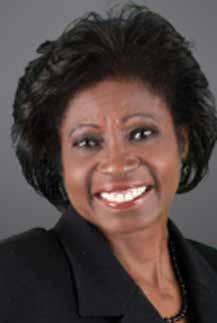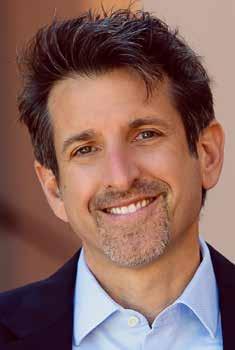
7 minute read
New Civil Rules Proposals Provide "Seismic" Changes
by keith grossman, esq.
In December 2021, a Judicial Management Council workgroup issued a 184-page report proposing sweeping changes intended to make the Florida civil trial system more efficient. The Chair of the Workgroup on Improved Resolution of Civil Cases, Second District Court of Appeal Chief Judge Robert Morris, presented the report to the Florida Bar Board of Governors at a meeting on Dec. 3. Judge Morris pointed to the 2 million cases in the state civil system that need to be resolved and said, “Just about every state and every jurisdiction has made an effort to manage this - the federal system did it decades ago. We need to do something about this and it’s our time to try and work on it. Attorneys Lorna E. Brown-Burton and F. Scott Westheimer are members of the Board of Governors, and both are candidates for President-Elect of the Florida Bar. They also both practice civil litigation. They clarified that The Florida Bar and Board of Governors have not taken a position yet on the report from the workgroup. Their comments are solely their opinions and not that of the Bar or the Board of Governors. Westheimer says the proposals in the report are “a major seismic shift to how we practice civil litigation.” He continues, “A vast amount of rules are proposed to be changed.” Brown-Burton agrees. “It will certainly be a paradigm shift.” She says, “When we (the Board of Governors) first heard it, there were certainly concerns raised.” She characterizes the recommendations as “sobering”. Westheimer says the report may be overwhelming to review but should be reviewed by all attorneys that practice civil litigation. “It would drastically change the way you practice law.” One of the cornerstones of the Workgroup’s report is the implementation of a differentiated case management system that would require judges to divide cases into “streamlined”, “complex” or “general” categories. Lawyers would be required to confer at the beginning of a case and craft a case management order that would set a trial date and deadlines

Lorna E. Brown-Burton, Esq.
for completing such tasks as discovery, dispositive motions and depositions. There will also be strict deadlines and restrictions on continuances.
The report also suggests there be public reporting of relevant case management data with the purpose of encouraging effective case management and accountability. Within the report, there is also an acknowledgement of the need for ongoing education about a differentiated case management system, professionalism and technology. Judge Morris says the changes are necessary, in part, because the public believes Florida’s civil system is too slow and too expensive. Westheimer highlights the following as his initial personal concerns from the report: • The ability for attorneys to have hearings on non-evidentiary motions or motions where the court would not have to decide issues of material facts would be at the Court’s discretion

• Mandatory attorney’s fees sanctions in some situations
• Loss of peremptory challenges as a potential sanction • Loss of a judge’s discretion and flexibility for continuances of hearings and trials Brown-Burton also expresses similar concerns and says, “How it improves the efficiency of the court needs to be understood better.” She also wonders how the changes would impact access to justice. The Florida Supreme Court appointed the Workgroup on Improved Resolution of Civil Cases on October 31, 2019. In part, the Workgroup was charged with focusing on a long-range strategic goal to “ensure the fair and timely resolution of all cases through effective management” and to “utilize caseload and other workload information to manage resources and promote accountability.” The Workgroup was directed to study the civil case management recommendations endorsed in 2016 by the Conference of Chief Justices and the Conference of State

F. Scott Westheimer, Esq.
Court Administrators and “the outcomes of pilot projects or other initiatives that have implemented these recommendations in this and other states.”
The Workgroup is comprised of nine members, including a former justice, trial and appellate judges, a chief county judge, a civil practitioner, and a former Florida Bar president. Both Brown-Burton and Westheimer point out the workgroup did not include any Board of Governor members and therefore, the Board of Governors did not have any input on the report. Brown-Burton says, “We have no knowledge other than what’s in the report itself and what Judge Morris shared at our meeting.” The Workgroup has now provided their proposals to the Supreme Court, who will have the final say on how to proceed. According to Judge Morris, it’s expected the Supreme Court will schedule a lengthy comment period before implementing any changes. The Supreme Court has not yet announced the comment period or the overall timeline for implementing the report’s proposals. Brown-Burton says, “Whether the Board of Governors will be able to weigh in further will be up to the Supreme Court. We are hopeful.” Judge Morris urges Board members to study the report carefully and be prepared to respond during the anticipated public comment period. Brown-Burton encourages all attorneys to participate in the comment period. She says all Board members “are interested in hearing from constituents.” Westheimer says, “Every attorney who practices civil litigation in state court needs to read this report and give comments.” Westheimer refers to the proposed case management system contained within the report and asks, “Is it something that’s viable? When looking at the differences between Circuits, does one size fit all?” He also believes additional funding would be necessary to implement the proposed case management system. He says the court system already lags in the amount of pay for court personnel compared to the private sector.
Brown-Burton says, “Every Circuit is looking at holding town halls with members of the Workgroup in attendance to answer questions. We need to understand the thought process behind the report and town halls will give us an opportunity to do that.” Lorna E. Brown-Burton is an “AV” rated attorney who has practiced law since 1987. She is a partner at Lubell | Rosen LLC and primarily practices workers’ compensation defense representing employers, selfinsureds, and carriers. Brown-Burton has experience in the areas of Labor and Employment, Social Security Disability, Foreclosure Defense and Bankruptcy Law. She owned and operated her own firm for over a decade, and later co-founded Brown-Burton & DeMicco, PLLC. In 2018, she joined Lubell | Rosen LLC as a partner to manage the Workers’ Compensation department. Brown-Burton has served as President of the Young Lawyers Section of the Broward County Bar Association along with her service to the Florida Bar Young Lawyers Division. Her service to the Bar has included chairing the Citizen Advisory Committee, the Screening Selection Committee for Judicial Nominating Commission applicants, a Special Committee on Implementing the Bar’s Strategic Plan, a Special Committee to Improve Developing the Bar’s Executive Director Succession Plan and a Special Committee to Improve Communications with Bar sections, divisions, and committees and voluntary bars and serving on the Communications Committee, Budget Committee and Disciplinary Procedure Committee, to name a few. She has been serving as the 17th Circuit representative to the Board of Governors since 2012. Her election website is lbbforfloridabarpresident.com F. Scott Westheimer is an “AV” rated attorney who has practiced law since 1996. He is Managing Partner of Syprett Meshad, P.A., located in Sarasota. His practice focuses on Complex & Catastrophic Plaintiff’s Personal Injury Law, Civil Trial & Commercial Litigation. Westheimer has served as President of the Sarasota County Bar Association as well as President of their Young Lawyers Division. His service to The Florida Bar has included, chairing the Disciplinary Review Committee, Program Evaluation Committee, and Communications Committee (twice), and serving on the Technology Committee, Legislation Committee and Second DCA Judicial Nominating Committee, to name a few. He has served on the Young Lawyers Board of Governors as well as serving as the 12th Circuit representative to the Board of Governors since 2013. He was a member of the Board of Governors Executive Committee from 2016-2021. His election website is Electwestheimer.com.
Brown-Burton is working with the Lee County Bar Association to coordinate a future date for her to speak to the LCBA members.
Westheimer will be speaking to the Lee County Bar Association on February 17, 2022. His CLE presentation is titled, “What to Know About Florida’s Lawyer Discipline System and How to Avoid It”.
– f. scott westheimer –

